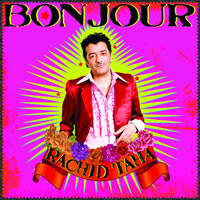Bonjour
On this his 8th studio album Rachid Taha’s “Bonjour” is no ordinary greeting. It is not the standard “bonjour” uttered reflexively in the street or on the telephone, but a more generous one reflecting Rachid’s nature. Rachid has been offering to get acquainted for nearly 30 years now. For all that time, his music has been saying “bonjour”, “bongiorno”, “hola”, “hello”, “as salaamu alaikum” and “guten tag”, greeting others with tireless, friendly enthusiasm. Already on the Made In Medina album in 2000, he sang “Come on over!”(Garab). On this record recorded in Paris and New York, he continues with “Come here” (Agi), “Hi” (Sélu) and above all “I love you” (Mon Amour - My Love). After asking “Where are you going?” (Ya Rayah), he adds “Where are you from?” (Mine Jaï), not out of any suspicion, but because he sees in other people that part of himself where shared dreams and desires are reflected. Since the 80s, Rachid has been consolidating his musical world on the basis of the exchange, movement and circulation of people, ideas, cultures and sounds. From rai to rock and electro to song, his landscape has continued to broaden. Now, on this new album, it forms an expanding, increasingly fertile, fresh-flowing confluent where he invites his listeners to take part in unforgettable festivities. This structured, appealing, open attitude has won him international recognition. Damon Albarn invited him to join his Africa Express project, ex-Led Zeppelin singer Robert Plant has cited him as an example and he is admired by U2 and Coldplay producer Brian Eno, who is now a friend (the two have given concerts in St. Petersburg and Sydney). Over the last few years, singer without borders Rachid Taha has appeared in Russia, Australia, Brazil, Hungary, Vietnam and Mexico, not to mention his native Algeria, adoptive country France, and the United States, land of influences, where he recorded this new album.
“I wanted to change my way of doing things,” admits Rachid, who has also changed his headgear. Goodbye beret and porkpie hat, hello Stetson. Like J.R. in Dallas? “No, like John Wayne in Rio Bravo!” he insists, ever a stickler for the proper reference. This time, he has headed out West. Initially, he worked on demos at home near Paris. Then he carried on writing the 10 new songs with Gaëtan Roussel, Louise Attaque singer and personal friend. “My albums have always been partnerships. Before, it was with Steve Hillage. We worked together for a long time. With Gaëtan, everything fell into place almost immediately and the record was the fastest I’ve made in my career.” You draw faster in a Stetson, one might say! The second phase was in New York, where Mark Plati, an Italian-American producer who has worked with many great names (David Bowie, The Cure, Alain Bashung, the Rita Mitsouko and Louise Attaque) welcomed him to his studio, Alice’s Restaurant. The Big Apple felt both familiar and new to Rachid, conducive to the perfect state of mind for a project of this kind.
The America Rachid loves is an idiosyncratic one, gleaned from John Ford westerns, Johnny Cash’s country music and Elvis Presley’s rock ’n’ roll. Yet it is also that nerve centre that transforms and returns the raw material supplied by its immigrants. A metalworker’s son, once fascinated by his uncle’s ranch in the Oran region, that Algerian Far West where he was born at the end of the 50s and spent part of his childhood, before being hauled around from Alsace to the Vosges to the suburbs of Lyon, Rachid inevitably feels at home there. On Ha baby, where phonetics flirts with semantics (“Habibi” means “my love” in Arabic), Rachid has achieved a perfect blend of country and Alger-style chaâbi popular music. This mixture of Kenny Rodgers and Farid El Atrache is a love song and jewel among others, with Hakim Hamadouche’s Arab lute twinned with Marc Copely’s National guitar to produce a set of finery Rachid offers to his beloved. The album, which begins with a vibrant Je t’aime (I love you) and ends on the tender, disarming Viens (Agi) (Come), is very much a declaration of love addressed to his partner, life and difference.
Love might seem a very commonplace subject, but sung from the heart, it can brighten any tune. Rachid understands this. He appreciates both the romantic Elvis of Now or Never or Love Me Tender, and the often scorned classics of French vintage pop. 23 years after his take on Charles Trenet’s Douce France (Sweet France) with his band Carte de Séjour, he brings us Bonjour (Hello) sung in Arabic and French with Gaëtan Roussel, a wonderful tribute to the French popular genre at its most sincere. This delicious exercise, which joins the naïve world of Amelie to the oriental ritornellos of Egyptian singer Abdel Alim Hafez, brings the simple greeting back into fashion, managing to raise a smile and even (why not?) a little optimism. Yet such lightness of tone is in no way symptomatic of an early form of vacuous amnesia in the singer. A famously sensitive and committed artist, Rachid has experienced too many personal and collective rifts to turn his back on the pain of exile, reawakened here with This is an Arabian song, where his friend Bruno Maman (an Algerian brother from Constantine) repeats “n’oublie jamais” (never forget) over a rock guitar backing. Elsewhere, Rachid reflects on the fraternal bond between Jews and Arabs, continually buried under successive layers of hatred and suffering (Mabrouk aalik). We can safely say that obscurantism will never be welcome at his table: on Sélu, he invites only purveyors of light - Averroès, Naghib Mahfouz, Camaron, Frantz Fanon, Lili Boniche and Youssef Chahine - rewarding each one of them with a vibrant flamenco greeting.
This has always been the way on Rachid’s albums. There is a time for love and a time for thought; a time for dreams and a time for memories. Then there is obviously a time for dancing, with the uncompromising Mindjey, a hip-hop/jeel-music hybrid whose electro programming (by his son Lyes) forms a stunning alloy when brought into contact with a bewitching oriental scale. In this sound environment where all cultures finally meet and exchange greetings, Rachid Taha is reconciled with his different selves. He has often wondered, “Am I Oriental or disoriented?” Here he provides the irrefutable answer: a record that bridges two cultures.







